Key takeaways:
- Bitcoin is a decentralized digital currency that operates on blockchain technology, providing security and transparency in transactions.
- Key benefits of Bitcoin include low transaction fees, financial sovereignty, accessibility, inflation hedging, and enhanced security through transparency.
- Future trends indicate increasing institutional adoption, the emergence of Bitcoin-based financial products, and the development of clearer regulatory frameworks to support investment.
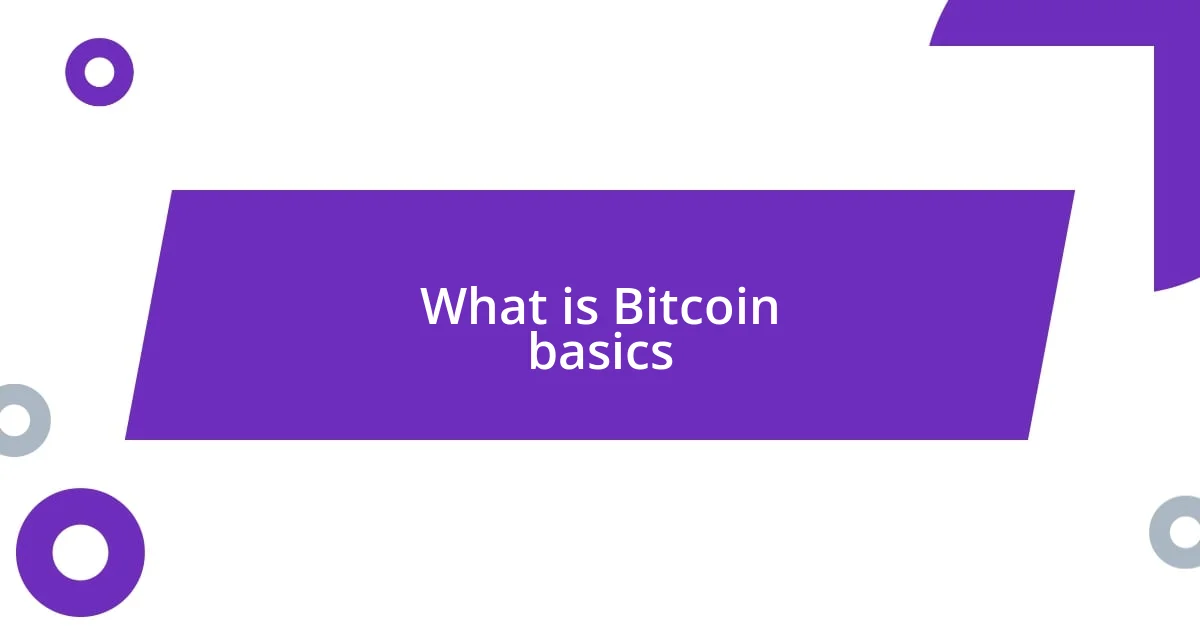
What is Bitcoin basics
Bitcoin is a form of digital currency, often referred to as cryptocurrency, which operates on a decentralized network. Unlike traditional currencies, Bitcoin is not controlled by any government or central authority, making it a fascinating alternative for many. I remember when I first discovered this aspect; it felt like a tiny rebellion against the norm of conventional banking.
At its core, Bitcoin relies on blockchain technology—a public ledger that records all transactions securely and transparently. Each transaction is validated by a network of computers, which adds a layer of trustworthiness that I didn’t fully appreciate until I saw how this mitigates fraud. Have you ever thought about how hard it is to trust other people with your money? Isn’t it refreshing to consider a system where trust is built into the very framework?
What I found particularly intriguing is how Bitcoin can serve as a store of value, much like gold. Some people buy Bitcoin with the hope that its value will increase over time, a concept I initially found puzzling. I remember feeling anxious when the price fluctuated wildly, but I eventually realized that this volatility is part of what makes it exciting! Isn’t it exhilarating to think about something that could revolutionize our financial landscape?
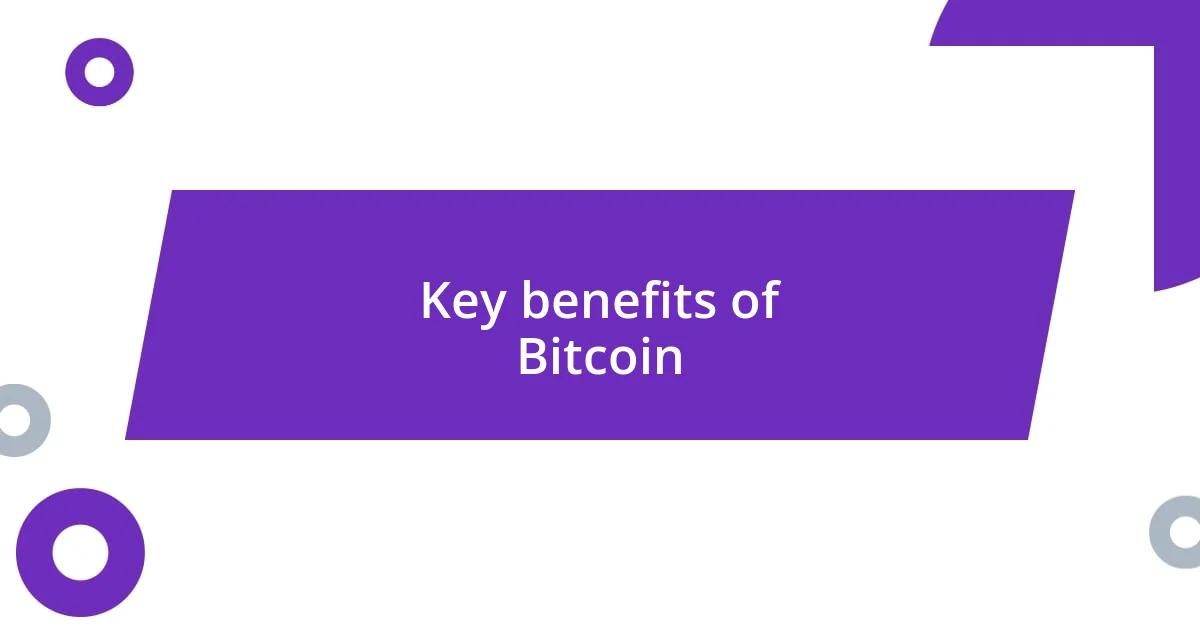
Key benefits of Bitcoin
Bitcoin offers several key benefits that can significantly enhance financial interactions. First and foremost, its decentralized nature means I can send and receive money without relying on intermediaries like banks. I remember the first time a friend and I transacted in Bitcoin; it felt like we had unlocked a new level of freedom, bypassing traditional systems that often impose delays and fees.
Here are some key benefits of Bitcoin that stand out to me:
- Low Transaction Fees: Compared to traditional banking systems, Bitcoin often has lower fees, especially for international transactions.
- Financial Sovereignty: Users have full control over their funds, reducing dependency on banks and governments.
- Accessibility: Anyone with an internet connection can access Bitcoin, which is transformative for those in underbanked regions.
- Inflation Hedge: With a capped supply of 21 million coins, Bitcoin can potentially act as a safeguard against inflation.
- Transparency and Security: The blockchain ensures that all transactions are publicly recorded and immutable, fostering trust.
The more I delve into Bitcoin, the more I appreciate its role as a catalyst for change. The idea that I can transact directly with someone on the other side of the world, bypassing traditional obstacles, fills me with a sense of empowerment. It’s like discovering a new tool that could redefine how we perceive ownership and control over our assets.
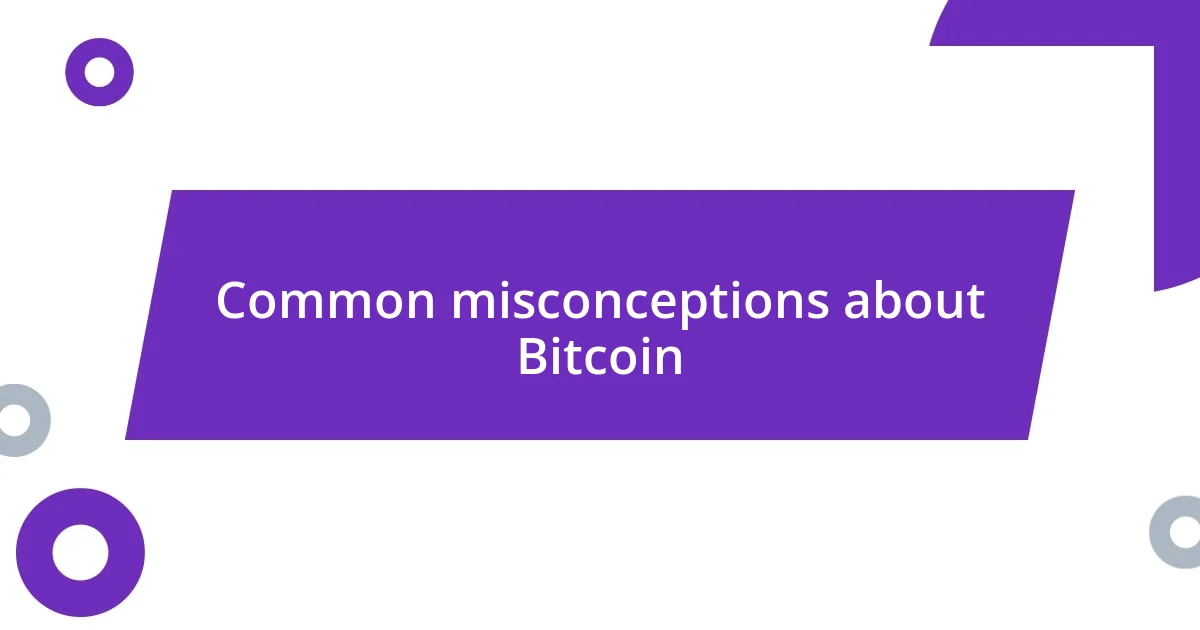
Common misconceptions about Bitcoin
It’s surprising how many misconceptions surround Bitcoin, one of which is the idea that it’s primarily used for illegal activities. While it’s true that some people have misused cryptocurrency, the vast majority of transactions are legitimate. In my experience, viewing Bitcoin solely through this lens can be incredibly limiting—like judging a book by its cover. There’s a vibrant, innovative community behind Bitcoin that’s focused on creating a financial future that’s more accessible and equitable for everyone.
Another common myth is that Bitcoin is completely anonymous. In reality, while Bitcoin transactions don’t require personal information, they are recorded on a public ledger, meaning they can be traced back to individuals. I remember when I first learned this; it shifted my perspective significantly. It’s essential to understand that if you want true anonymity, other cryptocurrencies might be more suited for that purpose. What surprises me is how many people are unaware of the nuances of privacy within the cryptocurrency landscape.
Lastly, many people believe that Bitcoin is just a bubble waiting to burst. While I understand the skepticism, I witnessed the growing adoption and integration of Bitcoin in various sectors. This made me appreciate its potential beyond mere speculation. As I’ve seen more businesses accept Bitcoin and even hold it on their balance sheets, the narrative surrounding it is evolving. In my journey with Bitcoin, I’ve learned that understanding its technology, use cases, and market trends can offer a more balanced view.
| Misconception | Reality |
|---|---|
| Bitcoin is primarily used for illegal activities | The majority of Bitcoin transactions are legitimate |
| Bitcoin is completely anonymous | Bitcoin transactions can be traced on a public ledger |
| Bitcoin is a bubble | Increasing adoption indicates potential long-term value |
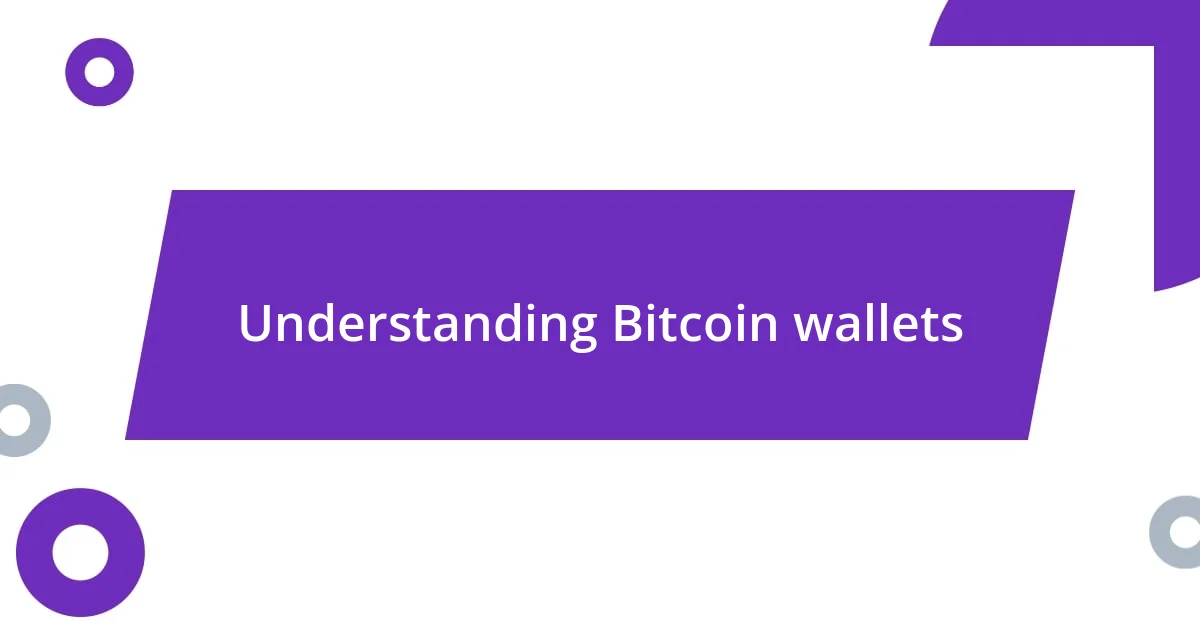
Understanding Bitcoin wallets
Understanding Bitcoin wallets can feel like stepping into a new world filled with possibilities. A Bitcoin wallet is essentially a digital wallet that allows you to store, send, and receive Bitcoin. At first, I was a bit overwhelmed by the variety of wallets available—like software wallets, hardware wallets, and even paper wallets. Each type has its pros and cons. For example, I prefer hardware wallets for their offline security, especially after hearing stories about exchanges getting hacked.
What I found particularly fascinating is how much these wallets emphasize personal responsibility. Unlike a traditional bank where you rely on them for security, with a Bitcoin wallet, you hold the keys to your funds. I learned this the hard way when I lost access to an old wallet because I misplaced my recovery phrase. This experience taught me the importance of keeping that phrase safe—it’s truly the lifeline to your Bitcoin. Have you ever thought about how much trust we place in banks, only to realize that with Bitcoin, it’s all in our hands?
When choosing a wallet, consider what you’re looking to achieve. If you plan to use Bitcoin frequently, a mobile wallet might be ideal for its convenience. However, if you’re more interested in long-term storage, as I am, then a hardware wallet becomes the go-to option. It’s almost like preparing your own personal treasure chest, and knowing that I have complete control and security over my funds adds a layer of peace of mind. The world of Bitcoin wallets is vast, but with a bit of exploration and understanding, it can be incredibly rewarding.
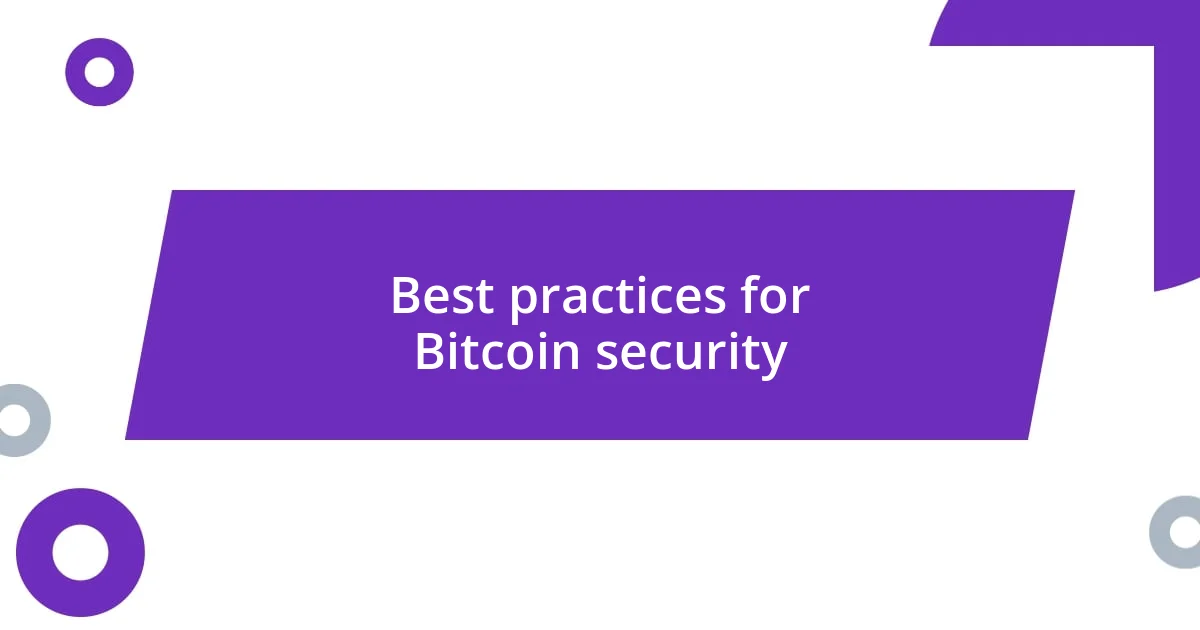
Best practices for Bitcoin security
Maintaining the security of your Bitcoin is crucial, and one of the best practices I’ve embraced is enabling two-factor authentication (2FA) on every platform that supports it. It adds an extra layer of protection on top of your password. I remember a moment when I received a notification about a suspicious login attempt on my exchange account; thanks to 2FA, I was able to thwart what could have been a significant loss. Have you considered how often you rely solely on passwords?
Another aspect I prioritize is regularly updating software that houses my Bitcoin, whether it’s my wallet or trading apps. Cybersecurity threats evolve rapidly, and I learned this the hard way after ignoring a wallet update, only to read about a critical vulnerability that could have exposed my funds. Staying vigilant not only safeguards my assets but also gives me peace of mind. It’s all about creating a habit—like checking the weather before stepping out—so why not include security in your daily routine?
Lastly, I advocate for cold storage, especially for those who consider Bitcoin a long-term investment. Storing Bitcoin on hardware wallets like Trezor or Ledger separates your assets from the internet, which is a common vector for attacks. I recall the joy I felt transferring a sizable amount from my exchange account to my hardware wallet—knowing it was safely offline lifted a huge weight off my shoulders. If you’re holding onto Bitcoin, isn’t it worth taking a few extra steps to ensure it remains secure from potential threats?

Future trends in Bitcoin investment
The future of Bitcoin investment is likely to see increasing institutional adoption. I remember my initial skepticism when large corporations began adding Bitcoin to their balance sheets. It felt unreal. But as I’ve watched major players like Tesla and Square make moves into crypto, it became clear that this trend is reshaping how we view Bitcoin—not just as a speculative asset, but as a viable part of a diversified portfolio. Have you considered how institutional interest might stabilize Bitcoin’s price and lend it greater legitimacy?
Another trend is the evolution of Bitcoin-based financial products. Reflecting on my own journey, I once felt overwhelmed by the various investment vehicles surrounding Bitcoin, like ETFs and futures contracts. Now, those options are growing, making Bitcoin accessible to a broader range of investors who might be apprehensive about buying it directly. I find myself wondering—how many more people could benefit from these products without the steep learning curve I faced?
Lastly, we can’t ignore the accelerating development of regulatory frameworks. As someone who’s navigated the murky waters of crypto legality, I’ve felt the frustration of unclear regulations. Lately, I’ve seen signs of progress, with governments recognizing the need for clarity, which could pave the way for safer investment environments. Isn’t it encouraging to think that, in the near future, clearer guidelines could help protect investors and foster confidence in Bitcoin investments?












